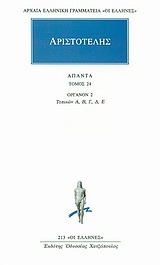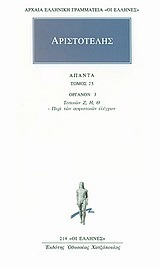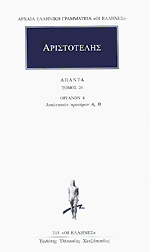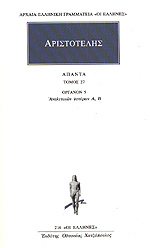


Books in series

Categories/On Interpretation
350

Όργανον 2
Τοπικών Α, Β, Γ, Δ, Ε
1994

Όργανον 3
Τοπικών Ζ, Η, Θ: Περί των σοφιστικών ελέγχων
1994

Όργανον 4
Αναλυτικών Πρότερων Α΄, Β΄
1994

Όργανον 5
Αναλυτικών Υστέρων Α΄, Β΄
1994
Authors

384 BC–322 BC Greek philosopher Aristotle, a pupil of Plato and the tutor of Alexander the Great, authored works on ethics, natural sciences, politics, and poetics that profoundly influenced western thought; empirical observation precedes theory, and the syllogism bases logic, the essential method of rational inquiry in his system, which led him to see and to criticize metaphysical excesses. German religious philosopher Saint Albertus Magnus later sought to apply his methods to current scientific questions. Philosophy of Saint Thomas Aquinas, the most influential thinker of the medieval period, combined doctrine of Aristotle within a context of Christianity. Aristotle numbers among the greatest of all time. Almost peerless, he shaped centuries from late antiquity through the Renaissance, and people even today continue to study him with keen, non-antiquarian interest. This prodigious researcher and writer left a great body, perhaps numbering as many as two hundred treatises, from which 31 survive. His extant writings span a wide range of disciplines from mind through aesthetics and rhetoric and into such primary fields as biology; he excelled at detailed plant and animal taxonomy. In all these topics, he provided illumination, met with resistance, sparked debate, and generally stimulated the sustained interest of an abiding readership. Wide range and its remoteness in time defies easy encapsulation. The long history of interpretation and appropriation of texts and themes, spanning over two millennia within a variety of religious and secular traditions, rendered controversial even basic points of interpretation.

Ο Αριστοτέλης (eng: Aristotle, Arabic: أرسطوطاليس) ένας απο τους μεγαλύτερους Έλληνες φιλοσόφους, ερευνητές και διανοητές, γεννήθηκε στα Στάγειρα της Χαλκιδικής απ' το γιατρό Νικόμαχο και τη Φαιστίδα το 385 π.Χ. Ακολούθησε το χρησμό του Μαντείου των Δελφών -του Πυθοί θεού χρήσαντος αυτώ φιλοσοφείν Αθήνησι- σπούδασε φιλοσοφία υπό τον Πλάτωνα στην Αθήνα και δίδαξε στην Ακαδημία (367 - 384 π.Χ.). Το 348 π.Χ., μετά το θάνατο του Πλάτωνα, πήγε μαζί με τον Ξενοκράτη στον Άσσο της Μικράς Ασίας και δίδαξε φιλολσοφία και επιστημονικά μαθήματα σε ευρύ κύκλο ακροατών. Το 345 π.Χ. ίσως ύστερα από πρόσκληση του Θεοφράστου, εγκαταστάθηκε στη Μυτιλήνη και έμεινε εκεί διδάσκων μέχρι το 342 π.Χ., που ο Φίλιππος του ανέθεσε τη διαπαιδαγώγηση του δεκατριετούς τότε Αλεξάνδρου. Το 336 π.Χ., μετά το θάνατο του Φιλίππου, επανήλθε στην Αθήνα και το 335 π.Χ., ίδρυσε μεταξύ Λυκαβηττού και Ιλισσού το "Λύκειο" που εκλήθη και "περίπατος" λόγω των πολλών στοών του Μεγάρου. Το 323 π.Χ., μετά το θάνατο του Μεγάλου Αλεξάνδρου, απεσύρθη στην Χαλκίδα, την πατρίδα της μητέρας του, όπου και πέθανε από στομαχικό νόσημα το 322 π.Χ. Τα περισσότερα έργα του Αριστοτέλη έχουν απωλεσθεί. Αυτά που έχουν διασωθεί διακρίνονται σε λογικά, φυσικά, βιολογικά, ψυχολογικά, μεταφυσικά, ηθικά, πολιτικά, τεχνολογικά και προβλήματα.